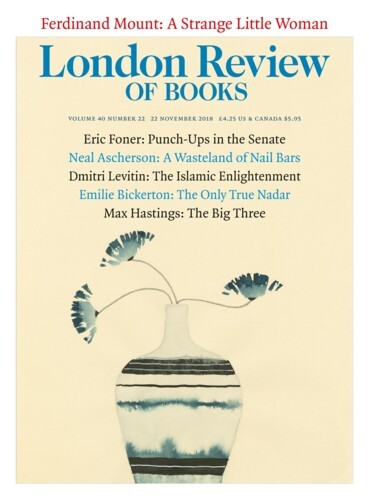In June 2002, Tom Pickard moved into a cramped attic in the Hartside Café in Cumbria, perched on Fiends Fell, six miles from Alston, where Pickard had been living. The café sits at the high point of the road between Penrith and Alston, one of the few trans-Pennine roads. At just below two thousand feet it was the highest café in England, and felt like the windiest. The escarpment falls away precipitously to the Eden Valley, facing ‘the mountains of the Lake District and sometimes when the sun is angled appropriately one of the lakes is visible and I can see where Coleridge and Wordsworth walked. Or if I look to the north, across the Solway Firth some fifty miles away, I can see hills that Burns, Hogg and Walter Scott would have known.’ It is also from the west the prevailing weather comes ‘unhindered … like Thor’s fucking hammer’. Pickard holed up at the café for the next ten years. In March this year, a few months after his book appeared, the building burned down.
Fiends Fell (Flood Editions, £13) collects diary entries from Pickard’s first year there, interspersed with poetry. The format is reminiscent of the Japanese haibun, a mixture of poetry and prose, a form originating with the 17th-century haiku master Matsuo Basho, whose most celebrated work is a diary of a five-month journey in 1689 into the ‘deep country’ north and west of the capital Edo, as Tokyo was then known. Pickard writes:
In 1650 Basho, on his journey into the deep north, is forced by a storm to lodge overnight in a cottage with two prostitutes. They discuss wind as an aphrodisiac; how it can eroticise dreams, or when making love becomes a third presence – sometimes a silky masseuse whose hair brushes air over skin, or a deranged husband howling at the window.
Basho did have an encounter with two courtesans who were lodging in the same inn, a room away, and overheard them lamenting their wretchedness and shame as he drifted off to sleep. In the morning they pleaded with him to take them with him, but he refused. Hardly erotic, as Pickard makes it out to be, but he is given to eroticising material, even the landscape:
Sometimes the wind seems like an enveloping orgasm that I’m being tossed around in. Sometimes riding, sometimes ridden. Then it’s breathing.
the emptiness
of winter fellsclaws of cloud grip a far hill
topped in snowa raven croaks
In the traditional haibun, the haiku follows a prose passage that is imitative of classical Chinese prose style and operates as a commentary, often elliptical and oblique, of that passage – a codicil of sorts.
This is Basho on his encounter with the courtesans and his abandonment of them:
‘It’s unfortunate,’ I said, ‘but we are always stopping here and there. Just entrust yourself to the way others are going. Surely the gods will protect you from harm.’ With these words we left them behind, but for a time the pity of their situation would not leave me.
in the same house
prostitutes, too, slept:
bush clover and moon
The tone of Basho’s diary is elevated, stern, and suffused with Buddhist notions of impermanence, suffering and the abnegation of self, quite unlike Pickard’s conversational, often playful tone and distinctly unphilosophical outlook. He is curious, restless, anxious to get out on the fells, interested in the weather, topography, sky, birdlife (he’s a serious birder) and especially the wind. The book is a mash-up of flashbacks, doings at the café, where he helps out, a sequence returning to the world of Jamie Allan, an 18th-century Gypsy/musician/highwayman of the border country who was the subject of a previous collection by Pickard, and nature writing reminiscent of Gilbert White’s Natural History of Selbourne or the weather journals of 18th-century amateur naturalists like Thomas Appletree of Edgiock or Thomas Barker of Lyndon Hall, White’s brother-in-law. Pickard often took along a camera to photograph birds or cloud formations, and a recording device to capture the sound of the wind.
It was a sun-bright day with a furious south-easterly as I lay sheltered from the blast in a deep body-sized dip of heather amongst fine grass and wild thyme to watch a kestrel drift into the wind above my skyline, about ten metres away. A small group of meadow pipets that habituate this summit became silent and lay low as it hovered close, hunting anything easy or careless. After a while the hawk was flipped off-kilter by a pair of ravens coming up from behind, shouldering the wind. Although struggling where the wind was fiercest they chose to get close to the hawk and forced it to flip and shift and drift to a patch of air three or four metres directly above where I lay and for a few long heart-hovering moments provided me the prey’s point of few … As I was reflecting on the incident and making note [the kestrel] reappeared even closer than before and resumed hovering, but when a warplane burned in under the radar, hugging the contours, the bird flipped and surfed out of sight. Two other jets followed in a mock battle just as the ravens and hawk had done earlier.
When Hartside Café caught fire, the snow was so thick the firemen had to use snowploughs to reach the building. The owners have recently put it up for sale. Tom Pickard now lives in Maryport, on the Cumbrian coast, just down the road from the Roman fort where Juvenal served as a conscript. He spends his days wandering the intertidal flats of the Solway Firth, taking note of the curlew’s ‘estuary echo’ and observing the ways of the gulls, sanderlings and winter migrants.
Send Letters To:
The Editor
London Review of Books,
28 Little Russell Street
London, WC1A 2HN
letters@lrb.co.uk
Please include name, address, and a telephone number.

